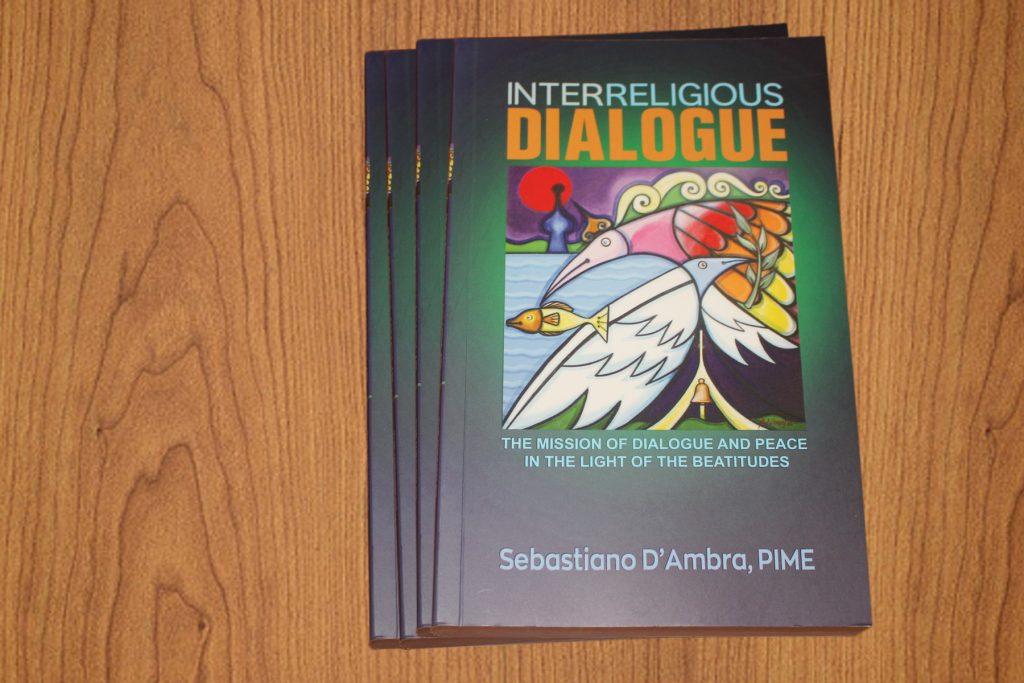
Today, the interest on Interreligious Dialogue is increasing, but often used as strategy in situations of conflict. Fr. Sebastiano D’Ambra, PIME who, for more than forty years, have been in the front line of interreligious dialogue in Mindanao and started the Silsilah Dialogue Movement in 1984 is convinced that the path to peace has to be achieved on the road of spirituality of dialogue that each religion can discover or rediscover in the deeper part of their faith. Guided by this understanding he has journeyed with many on the path of the spirituality of life-in-dialogue with God, with the self, with others and with creation promoting dialogue as a “style of life”. Guided by this understanding and the teaching of the Church Fr. D’Ambra, elected new executive secretary of the Catholic Bishops’ Conference of the Philippines (CBCP) for the Episcopal Commission for Interreligious Dialogue (ECID), has written a new book on INTERRELIGIOUS DIALOGUE as a MISSION OF DIALOGUE AND PEACE IN THE LIGHT OF THE BEATITUDES. The book is addressed especially to Catholics who next year 2020 will celebrate the year of Interreligious Dialogue and Ecumenism in preparation for the year 2021 when Christians celebrate the 500 years of Christianity in the Philippines. The book was launched last March 28 during the inauguration of the new office of ECID in Manila in the presence of a group of friends who came for the occasion and they committed to form a core group to help in promoting Interreligious Dialogue in Manila.
The gathering was very friendly and touching because each participant presented their experience of dialogue from the time when Silsilah and Fr. D’Ambra had invited them to be part of this new mission.
Presenting the new book, Fr. D’Ambra shared his experiences emphasizing the importance of spiritual formation. This is also an answer to some participants who reported that in areas where there are not so many Muslims, Christians tend to say that they do not need “Interreligious Dialogue”. The new book is a good guide to demonstrate that all of us have to start a journey towards Interreligious Dialogue, Harmony and Peace as part of our spiritual and social formation. Thus, the book helps to change the paradigm of dialogue emphasizing the CULTURE OF DIALOGUE and the spiritual journey that the Christians can find roots in the Beatitudes. The book touches also the concrete situation of the Philippines and especially of Mindanao and gives the foundation of a sustainable dialogue based on spirituality. In this way the so called, “Culture of Peace” becomes a “Vision of Peace” that needs to be gradually achieved by the transforming power of the Culture of Dialogue on the personal and social level. The author of the book says clearly that interreligious dialogue goes beyond the normal understanding of “strategy” of dialogue and peace. This has a big implication especially now that many sectors of society are alarmed by ideologies of violence, often justified by the understanding of their faith. Indeed, this is a very critical time in the history and we cannot overcome this crisis if we continue to focus all our attention on security and strategies. The teaching of the Church after Vatican Second Council must be clear for the Catholics. Of course, it is also clear in the Gospel, but often it is not emphasized properly. Thanks to God, now the Christians have also many documents of the Church and many good examples to follow on the path of Interreligious Dialogue. The new book on Interreligious Dialogue presents also some promising experiences on the parts of the Muslims and other religions that can help to guide all move on the right direction. The new book was published by the Claretian Communications Foundation, Inc. in the Philippines and we hope it will be used by many as a formation book for Interreligious Dialogue. There are also many other books and materials that the ECID has collected and gathered to share and to help many to give a special attention to Interreligious dialogue, not only as an answer to specific problems in specific areas, but also as a new understanding of dialogue as an expression of love. This concept was, once again, presented to us by Pope Francis and the Grand Imam of Al-Azhar Ahmad Al Tayyab in the recent document of February 4, 2019 signed in Abu Dhabi entitled, “Human Fraternity for World Peace Living Together”. We are sure that the new books of Fr. D’Ambra can help to contribute to form many. This is the Mission that the ECID has to do especially in preparation to the year of interreligious Dialogue and Ecumenism. This is also a reason for us to move, to live and promote dialogue and peace.

